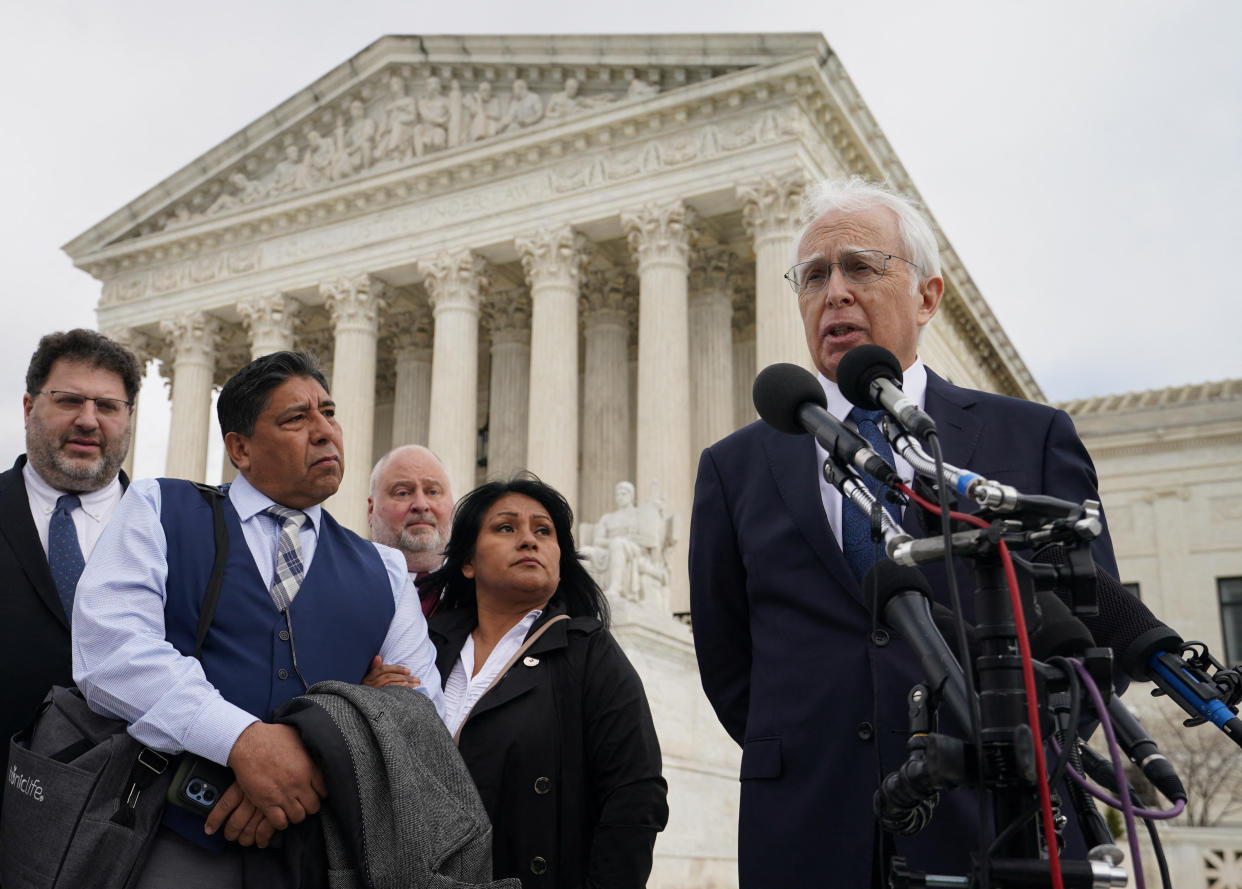Expert's view of 2 SCOTUS cases on internet liability
The U.S. Supreme Court this week wrestled with arguments from Google (GOOG) (GOOGL), Twitter, and Facebook (META), in two sister cases that say the companies should be liable for “aiding and abetting” terrorist attacks allegedly tied to content posted to their platforms.
In the cases, Gonzalez v. Google and Twitter v. Taamneh, the court could set new boundaries to interpret Section 230 of the Communications Decency Act, a 1996 law that arguably supports the economic models of social media and other interactive websites hosting third party content—and antiterrorism laws that allow victims of international terrorist attacks to seek compensation from those who “aid and abet” the assaults.
Section 230 law broadly exempts websites from legal liability when harm is caused by that content.
Section 2333 of the Anti-Terrorism Act, as amended, allows U.S. nationals injured by an act of international terrorism perpetrated by a designated foreign terrorist organization to sue those who sponsor the attacks.
The court is expected to hand down rulings in both cases before July.
Legal experts say that justices across the ideological spectrum made strange bedfellows in their reluctance to broadly tackle the difficult issues presented by both Section 230 and the antiterrorism laws.
“However, in some sense, that may be a blessing in disguise,” Doug Mirell, a partner with the law firm Greenberg Glusker Fields Claman & Machtinger and Section 230 expert, told Yahoo Finance. “At least to the extent it motivates Congress to finally address, in a bipartisan way, the defects that the past quarter century of experience has revealed.”
One potential reason for treading lightly: limiting 230 protection, said attorney Neama Rahmani, could upend the economic models that sustain social media platforms and other sites that rely on others’ content to fuel lucrative advertising markets. More liability could push sites to remove significantly more or less potentially harmful or offensive content and expose sites to higher legal expenses.
“If I can sue Google instead of suing some idiot on the internet, I’m going to sue Google with its unlimited budget,” Rahmani said. “[The justices] don’t want litigation and frivolous lawsuits.” Rahmani expects unanimous or near unanimous decisions from the court, given his impression that conservative justices Brett Kavanaugh and Clarence Thomas and centrist justice John Roberts seemed to back away from interest in overhauling Section 230.
“I think people were concerned before the arguments that there’s a chance that 230 could be struck down,” Rahmani said. “I give it absolutely no chance of happening.”

Ben Berkowitz, a partner at the law firm Keker, Van Nest & Peters, who helped file an amicus brief on behalf of Google in the Gonzalez case, said the justices were right to worry about expanding litigation against platforms that neutrally host and recommend internet content.
“This is an issue that impacts not only the platforms, but all internet content creators and users. In other words, all of us,” Berkowitz said. “After this week’s arguments, we remain cautiously optimistic that the Supreme Court will take these concerns seriously.”
Justice Neil Gorsuch suggested during arguments in Gonzalez that algorithms by design are incapable of genuine neutrality.
Mirell, the 230 expert, added: even if the justices are inclined to alter the platforms' immunity, that impulse should be constrained by the narrow facts presented in the cases. In each case, he explained, the plaintiffs base their claims on unique circumstances that allow suits against those who “aid and abet” terrorism under the Justice Against Sponsors of Terrorism Act. Instead of doing anything to change 230, he said, the justices could take the off-ramp suggested by Justice Amy Coney Barrett and hold that the platforms' conduct doesn't qualify as “aiding and abetting” terrorism.
In Gonzalez, argued on Tuesday, the plaintiffs' proposed that YouTube’s organizational algorithms that recommended harmful ISIS terrorist regime videos to targeted users should be treated not as third party content, but as content created by YouTube. The recommendation and accompanying video thumbnail generated by YouTube, they claim, is not covered by Section 230’s liability shield.
The case was brought by family members of Nohemi Gonzalez, a 23-year-old U.S. citizen killed in a December 2015 ISIS shooting at Paris' La Belle Equipe bistro, who say Google’s YouTube service knowingly permitted and recommended, via algorithms, inflammatory ISIS-created videos that allegedly played a key role in recruiting Gonzalez’s attackers.
On Wednesday, in the Twitter case, the plaintiffs said they should be permitted to hold the social media company, as well as sites like Google’s YouTube and Meta’s Facebook, legally responsible for "knowingly" providing substantial assistance to ISIS by hosting the terrorist regime's content through “willful blindness."
The case was brought by relatives of Nawras Alassaf, a Jordanian man killed in a 2017 ISIS attack in Turkey, who allege that the social media sites served as ISIS’ “vehicle of choice in spreading propaganda.”
Twitter argues that it cannot be held liable under the antiterrorism laws because it provides generic, widely available services to its users, regularly working to detect and prevent terrorism-related content. The company said it didn't "knowingly" provide substantial assistance to the terrorists, as required by law, and that the plaintiff failed to show that the terrorists used its platform in connection with the specific attack that injured the plaintiff.
Asked if he foresees a scenario where the court carves out an exception where a platform providing generic services can be held liable for aiding terrorism, Rahmani said it's possible, yet unlikely.
"The justices know it’s going to be very hard to make a suggestion that doesn’t swallow the rule," he said.
Alexis Keenan is a legal reporter for Yahoo Finance. Follow Alexis on Twitter @alexiskweed.
Follow Yahoo Finance on Twitter, Facebook, Instagram, Flipboard, LinkedIn, and YouTube
Find live stock market quotes and the latest business and finance news
